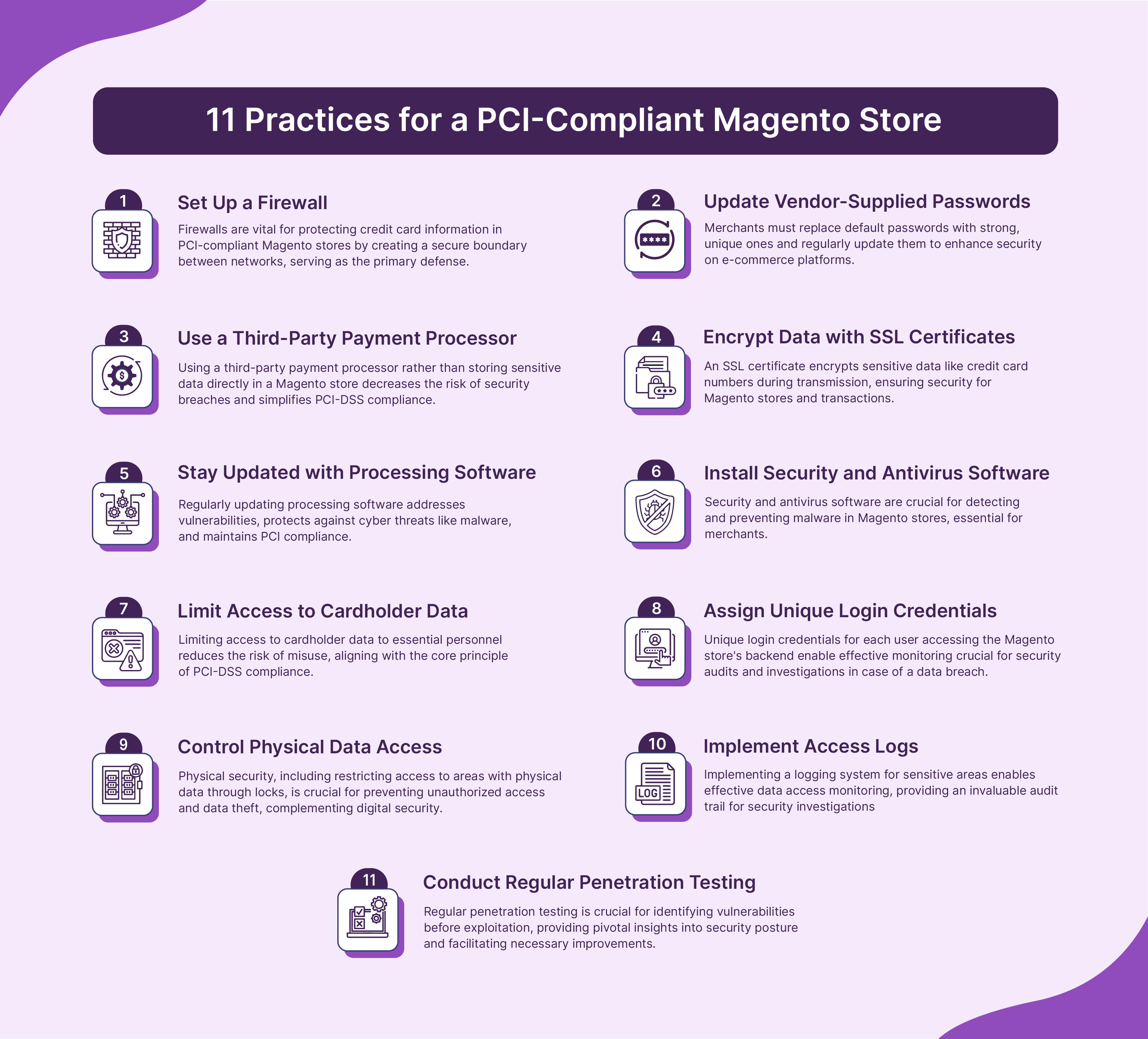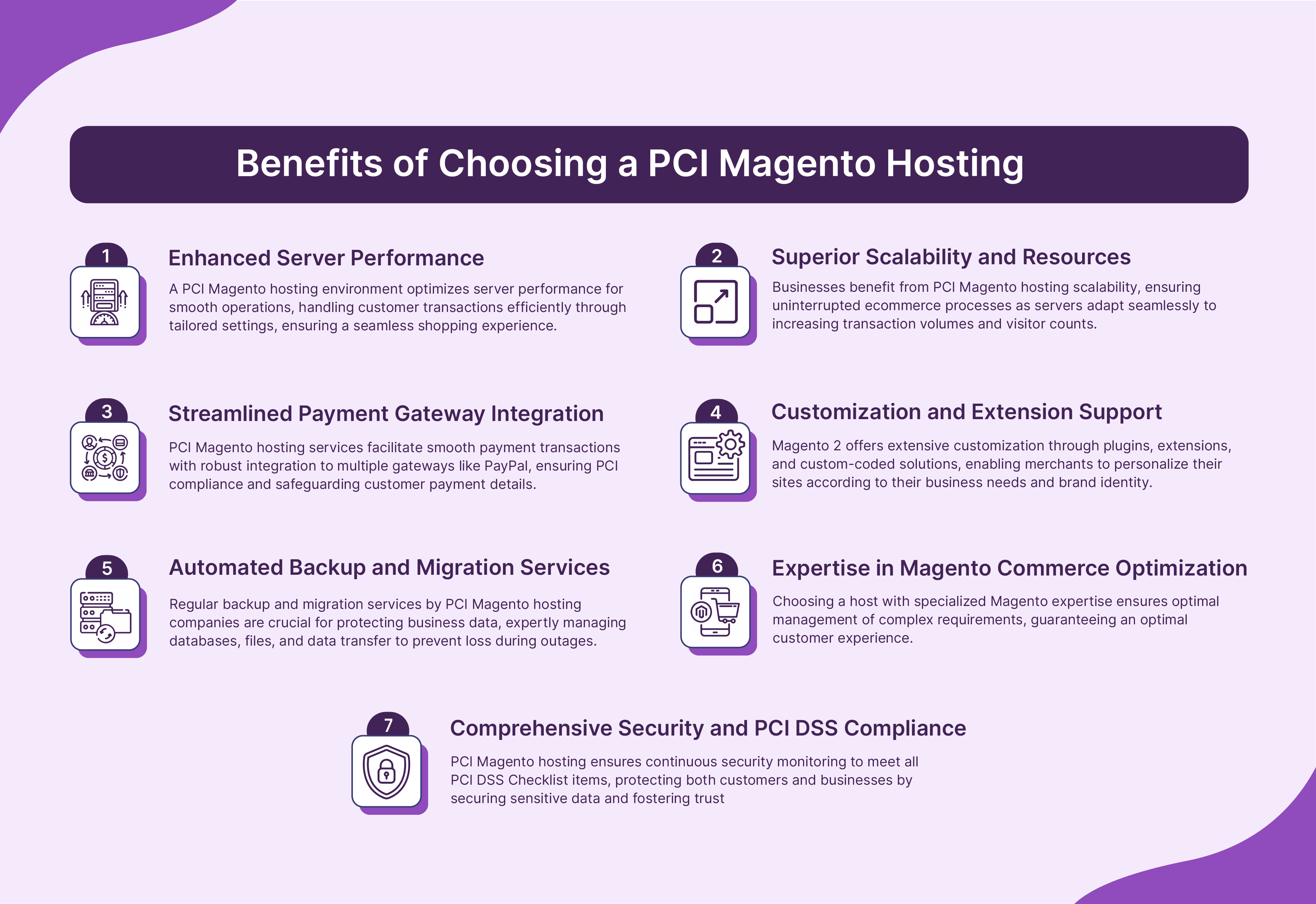
PCI Magento Hosting: 11 Practices for a PCI-Compliant Store
PCI Magento hosting enables stores to comply with Payment Card Industry Data Security Standards (PCI-DSS). It not only secures sensitive financial data but also builds consumer confidence. This article discusses 11 best practices for maintaining a PCI-compliant store with Magento hosting.
Key Takeaways
-
PCI Magento hosting simplifies achieving PCI-DSS compliance and secures online transactions.
-
Regular security updates, backups, and expert support are crucial features of PCI hosting.
-
Transaction volumes determine merchant compliance levels and require appropriate measures.
-
Firewalls, encryption, and controlled access to data are top practices for maintaining compliance.
-
Continuous monitoring and regular penetration testing are essential for identifying and mitigating threats.
What is PCI-DSS?

PCI-DSS (Payment Card Industry Data Security Standards) is a set of security standards businesses must follow to receive support from major payment card networks. The PCI Security Standards Council defines these requirements, including American Express, Mastercard, Discover, Visa, JCB, etc. The council ensures that data and transactions are secure, providing customers peace of mind.
Why Choose PCI Magento Hosting?
Merchants can comply with PCI-DSS standards in various ways. For Magento users, PCI hosting is an ideal solution that offers a secure platform for online stores to process credit card payments securely. Here's why you should choose a PCI-compliant Magento hosting:
1. Security
PCI Magento hosting provides multiple layers of security to prevent data breaches and cyber-attacks. It ensures that all data transmissions are encrypted, including credit card information. Additionally, hosting providers regularly conduct security audits and updates to ensure your store's highest level of protection.
2. Simplified Compliance
PCI-DSS compliance can be a complex process for merchants. The hosting provider handles most requirements with PCI Magento hosting, such as network scans and vulnerability assessments. This simplifies the compliance process for merchants and reduces their workload.
3. Expert Support
Hosting providers offering PCI-compliant solutions have a team of experts who understand the specific requirements for maintaining a compliant store. They can provide guidance and support to ensure your store remains secure and meets all compliance standards.
4. Regular Backups
With PCI Magento 2 hosting, regular backups are included in the service. This ensures that your store's data is always protected and can be restored in case of a cyber-attack or hardware failure.
5. Reputation Management
Data breaches result in financial losses and damage a company's reputation. With PCI-compliant hosting services, you can assure customers their data is safe and secure, building trust and loyalty in your brand.
6. Avoid Penalties
Failure to comply with PCI-DSS standards can result in severe penalties, including fines and the revocation of payment processing privileges. Choosing a PCI-compliant hosting provider ensures your store meets all requirements and avoids potential penalties.
11 Practices for a PCI-Compliant Magento Store

1. Set Up a Firewall
Firewalls act as the first line of defense in network security, establishing a barrier between secure internal networks and untrusted external networks, such as the Internet. By setting up a robust firewall, merchants can prevent unauthorized access to credit card information. A PCI-compliant Magento store must have a firewall configured correctly to protect sensitive data from potential threats.
2. Update Vendor-Supplied Passwords
Default passwords supplied by vendors for devices and software are a common vulnerability. Merchants must replace these with strong, unique passwords to bolster security. Regularly updating these passwords further reduces the risk of unauthorized access, contributing to a more secure e-commerce platform.
3. Use a Third-Party Payment Processor
Storing sensitive data directly in your Magento store can increase the risk of security breaches. By utilizing a third-party payment processor, credit card information bypasses your system altogether, significantly reducing the risk of data theft and simplifying compliance with PCI-DSS standards.
4. Encrypt Data with SSL Certificates
Encryption is critical for protecting data during transmission. An SSL certificate helps to encrypt sensitive information such as credit card numbers, ensuring that data is unreadable to anyone who might intercept it. Any Magento store must have A valid SSL certificate to ensure secure transactions.
5. Stay Updated with Processing Software
Outdated software can have known vulnerabilities that are easily exploitable. Regularly checking for and applying updates to your processing software helps close these security gaps and protects against malware and other cyber threats. Keeping software updated is a simple yet effective practice for maintaining PCI compliance.
6. Install Security and Antivirus Software
Security and antivirus software are essential for identifying and mitigating threats to your Magento store. These programs can detect and eliminate malware, provide real-time scanning, and help prevent potential breaches. It's a fundamental security measure that merchants should never overlook.
7. Limit Access to Cardholder Data
Access to cardholder data should be granted on a need-to-know basis. By restricting data access to essential personnel only, accidental or intentional data misuse is minimized. This selective access approach is a core principle of PCI-DSS compliance.
8. Assign Unique Login Credentials
Unique login credentials ensure that each user's activity can be monitored and traced. This accountability is important for security audits and investigations in a data breach. Merchants should require individual logins for anyone accessing the Magento store's backend.
9. Control Physical Data Access
Physical security is as important as digital security. Restricting access to areas where physical data is stored, such as locking rooms or cabinets containing hard drives and paperwork, helps prevent unauthorized access and potential data theft.
10. Implement Access Logs
Maintaining logs for individuals entering areas with sensitive information is an effective way to monitor and control data access. It creates an audit trail that can be invaluable during security investigations. A log system also deters unauthorized access through increased accountability.
11. Conduct Regular Penetration Testing
Identifying vulnerabilities before they can be exploited is crucial. Regular penetration testing simulates cyberattacks on your security systems and network, revealing potential weaknesses. These tests are pivotal for understanding the current state of your security posture and making necessary improvements.
Magento Hosting PCI Compliance Features
1. Firewall Protection
A firewall is a barrier between your website and potential threats. It monitors and controls incoming and outgoing network traffic, preventing unauthorized access to your data.
2. Secure Network Infrastructure
A secure network infrastructure is key to protecting sensitive data. This includes implementing security measures such as encryption, intrusion detection systems, and regular vulnerability scans.
3. DDoS Mitigation
Distributed Denial of Service (DDoS) attacks can cripple a website and compromise sensitive data. A PCI-compliant hosting provider should have measures to detect, mitigate, and protect against these attacks.
4. Regular Backups
In the event of a security breach or data loss, regular backups are crucial for quickly restoring your website and minimizing downtime. Look for a hosting provider that offers frequent backups and secure storage options.
5. SSL Certificate Support
SSL certificates encrypt data transmission between your website and its users, making it more difficult for hackers to intercept sensitive information. A PCI-compliant hosting provider should support the use of SSL certificates.
6. 24/7 Security Monitoring
Continuous monitoring by trained security professionals can help detect and respond to potential threats promptly. Choose a hosting provider with 24/7 security monitoring to protect your website.
7. Regular Updates and Patches
Outdated software can leave vulnerabilities that hackers can exploit. A PCI-compliant hosting provider should regularly update and patch all software used on their servers. This is done to prevent potential security breaches.
8. Secure Payment Processing
Secure payment processing is crucial for maintaining PCI compliance if you run an online store. Look for a hosting provider that offers secure payment processing options or integrates with reputable third-party payment processors.
PCI Compliance: Merchant levels
1. Level 1 Merchant Compliance
For businesses with a massive volume of transactions, Level 1 merchant compliance applies. This includes any entity processing over 6 million transactions annually from Visa, Discover, or Mastercard.
American Express merchants surpass 2.5 million transactions. Any JCB merchant with more than one million transactions also falls into this category. Entities at this level must adhere to the most stringent PCI compliance requirements. This is due to their high transaction volumes and the increased risk they present.
2. Level 2 Merchant Compliance
Level 2 merchant compliance targets those processing mid-range volumes of transactions. Specifically, this includes businesses with one to six million transactions from Visa, Discover, or Mastercard. For American Express, the bracket ranges between 50,000 to 2.5 million transactions annually.
3. Level 3 Merchant Compliance
Smaller businesses processing 20,000 to one million transactions annually using Visa or Mastercard fall under Level 3 merchant compliance. American Express defines this level by an annual transaction count between 10,000 and 50,000.
Despite fewer transactions than larger counterparts, businesses at this level must maintain proper security measures to protect cardholder data.
4. Level 4 Merchant Compliance
Level 4 merchant compliance is for businesses with the lowest transaction volumes. This level applies to merchants processing fewer than 20,000 Visa or Mastercard transactions annually.
For American Express, it applies to those processing 10,000 or fewer transactions. Despite lower volumes, these merchants must uphold PCI standards to handle payment data securely.
Benefits of Choosing a PCI Magento Hosting

1. Enhanced Server Performance
A PCI Magento hosting environment is optimized to deliver top-tier server performance. This ensures web and ecommerce sites run smoothly, handling customer transactions quickly and efficiently. Optimization techniques tailor server settings for Magento's database-heavy operations, offering a seamless shopping experience.
2. Superior Scalability and Resources
Businesses using Magento commerce can harness the scalability of PCI Magento hosting solutions. As transaction volumes and visitor counts increase, a scalable server can effortlessly adapt to meet growing demands. This ensures that ecommerce processes remain uninterrupted for businesses.
3. Streamlined Payment Gateway Integration
Facilitating smooth payment transactions is crucial. PCI Magento hosting services support robust integration with multiple payment gateways. This makes it straightforward for businesses to add services like PayPal. This integration is PCI Compliant, safeguarding customer payment details.
4. Customization and Extension Support
Magento 2 is renowned for its high degree of customization. Merchants can enhance their sites with plugins, extensions, and custom-coded solutions. This allows for personalization that reflects their business needs and captures the unique essence of their brand.
5. Automated Backup and Migration Services
Regular backup and secure migration services are critical for protecting business data and ensuring continuity. A PCI Magento hosting company offers expert management of databases, files, and everything in between. They ensure data loss prevention during transfers or outages.
6. Expertise in Magento Commerce Optimization
Selecting a host with specialized expertise in Magento is crucial. They can professionally handle the complex requirements of Magento commerce. This includes database optimization, performance tuning, and fine-tuning all processes and applications. The goal is to provide the best customer experience possible.
7. Comprehensive Security and PCI DSS Compliance
PCI Magento hosting includes continuous security monitoring. It is designed to meet all PCI DSS Checklist items. This protects both the customers and the business. It secures sensitive data against potential breaches. It creates an environment of trust and security for everyone involved.
FAQs
1. How can cart visitors affect my website's PCI Compliance level?
Cart visitors' volume can shift a merchant's classification level due to transaction counts, potentially changing your compliance requirements and the associated security measures you need to implement.
2. Are penetration tests necessary for Magento websites?
Penetration tests are a critical method for uncovering vulnerabilities, even for small websites, and they are a requirement for certain PCI compliance levels to ensure data security.
3. What role do employees play in maintaining PCI Compliance?
Employees are essential to Magento compliance; they must be trained on your security policy, understand regulations, and follow protocols to guard against data breaches and compliance issues.
4. Why should a person choose products that support Magento PCI Compliance?
Selecting products that support PCI Compliance helps businesses protect customer data, avoid penalties, and can offer an advantage in trust and reliability over competitors that do not.
5. What changes should I file to align with Magento PCI Compliance upgrades?
To remain compliant, regularly file updates to your security policy in light of PCI standards changes, including system upgrades and maintenance logs.
6. Is my WordPress site affected by PCI Compliance standards?
Yes, WordPress sites that process payments must adhere to PCI standards. This includes ensuring that PHP scripts, plugins, and payment gateways are secure and up to date.
7. How often should companies review their PCI DSS maintenance logs at the data center?
Companies should regularly review maintenance logs as part of their PCI DSS regime to ensure continuous adherence to regulations and swift identification of security issues.
Summary
With a PCI Magento hosting provider, stores of all sizes can maintain PCI DSS compliance and protect their customers' sensitive data. By implementing these practices, businesses can establish customer trust and reliability, avoid penalties, and secure online transactions.
Managed Magento hosting ensures top performance and robust security for e-commerce platforms, essential for maintaining PCI DSS compliance.


